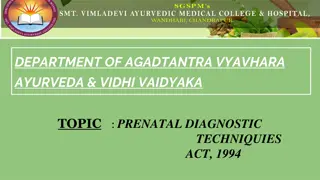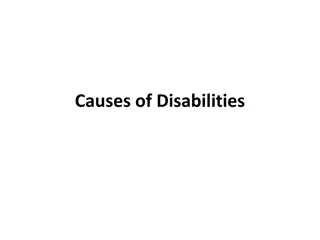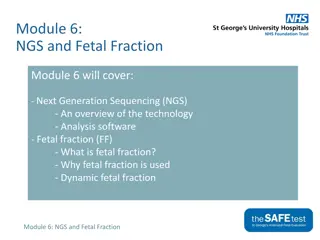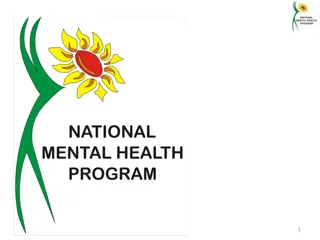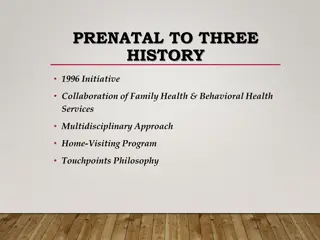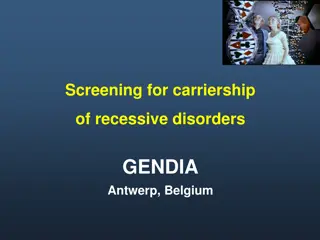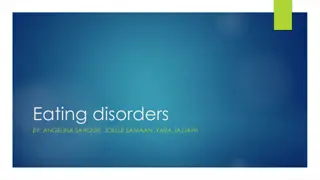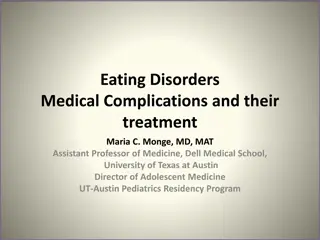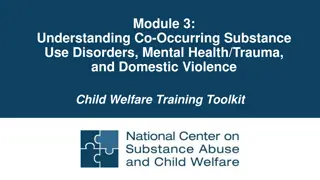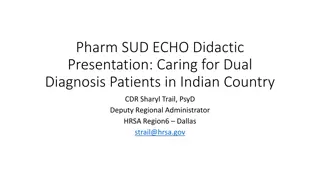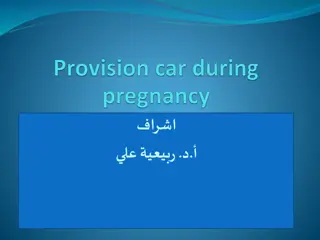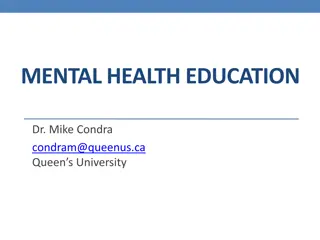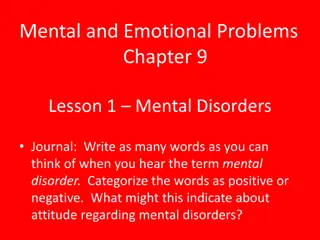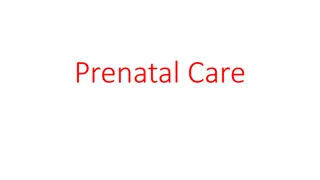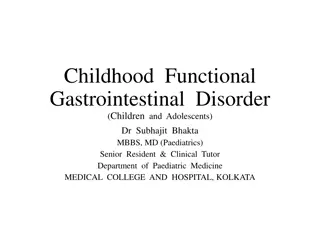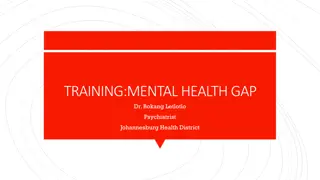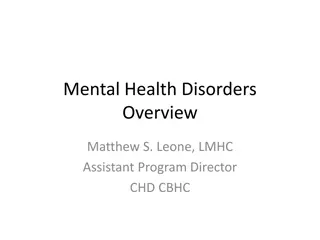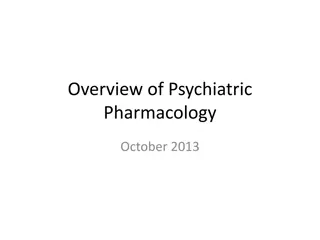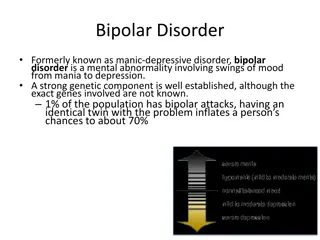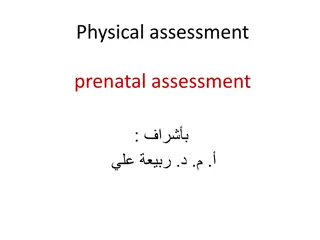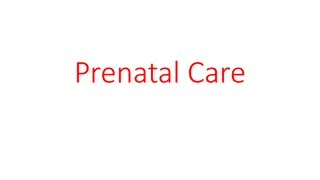Acknowledgement of Country
Acknowledging the impact of mental illness in legal settings, this content delves into identifying mental disorders, communicating effectively, and the importance of recognizing mental health issues. It highlights the prevalence of mental disorders in court-involved individuals, the criteria for men
3 views • 11 slides
Exploring Mental Health Categories and Disorders
In today's categories, we delve into themes like stigma, recovery, myths, and facts surrounding mental health. We discuss various disorders including psychotic disorders and observable signs like hallucinations, delusions, and flat affect. Discover the signs and symptoms of mood disorders and high/l
1 views • 71 slides
Understanding Mental Health vs. Mental Illness
Explore the nuanced differences between mental health and mental illness, where mental health pertains to the quality of mental and emotional wellbeing for everyone, while mental illness refers to diagnosable conditions with long-term effects that do not affect everyone in the same way. Gain insight
9 views • 18 slides
Importance of Prenatal, Intrapartum, and Postnatal Care in Maternal Health
Prenatal, intrapartum, and postnatal care plays a crucial role in ensuring the well-being of both mother and child. This module aims to equip participants with the knowledge and skills to explain the significance of these care services, guide the delivery of such services based on WHO guidelines, an
3 views • 41 slides
Understanding Mental Health and Pandemics
This module delves into mental health terminology, the impact of pandemics on mental well-being, identifying mental distress, tools for prevention and response, and providing support during acute phases of mental health issues. Learners will gain knowledge on various concepts related to mental healt
0 views • 14 slides
Understanding the Prenatal Diagnostics Techniques Act of 1994 in India
The Prenatal Diagnostic Techniques Act of 1994 in India aims to curb female foeticide and address the dwindling sex ratio by prohibiting prenatal sex determination. This legislation regulates diagnostic methods, prevents sex selection, and focuses on detecting genetic disorders, metabolic abnormalit
0 views • 15 slides
Overview of Human Genetic Disorders
Human genetic disorders encompass a range of conditions, from recessive disorders like cystic fibrosis to dominant disorders such as Huntington's disease. Examples include cystic fibrosis, Huntington's disease, and sickle-cell anemia. Understanding genetic disorders involves research and awareness o
0 views • 10 slides
Causes of Disabilities Across Different Stages of Life
Disabilities can arise at various stages of life, including prenatal, perinatal, infancy, early childhood, adolescence, adulthood, and old age. The causes of disabilities can be categorized into prenatal, perinatal, and postnatal factors. Prenatal causes include genetic deformities, maternal health
0 views • 24 slides
Overview of Anxiety and Related Disorders
Anxiety disorders, such as PTSD, panic disorders, phobias, agoraphobia, and OCD, are characterized by varying degrees of fear and distress. Anxiety is a normal response to danger, but when it becomes chronic, it can lead to debilitating conditions. PTSD occurs post-trauma, panic disorders involve in
1 views • 42 slides
Understanding NGS and Fetal Fraction in Prenatal Screening
Next Generation Sequencing (NGS) plays a key role in prenatal testing by analyzing cell-free DNA (cfDNA) to determine fetal fraction and detect genetic anomalies like Down syndrome. The process involves DNA extraction, library construction, barcode labeling, sample pooling, quantification, and seque
0 views • 13 slides
Enhancing Mental Healthcare in Prisons: Integrating Care Programme Approach and Community Mental Health Framework
Planning effective mental healthcare in prisons involves utilizing the Care Programme Approach and the Community Mental Health Framework to address challenges in service delivery, ensuring continuity of care, and providing support for complex mental health needs in the prison population. The Communi
4 views • 27 slides
Understanding Somatic Symptom Disorders, Conversion Disorders, and Dissociative Disorders
Somatic symptom disorders manifest as physical symptoms without apparent cause, while conversion disorders involve specific physical symptoms incompatible with medical conditions. Illness anxiety disorder involves interpreting normal sensations as disease symptoms. Dissociative disorders lead to a s
1 views • 41 slides
Understanding Mental Health in Tower Hamlets: Key Stats and Strategies
The Tower Hamlets JSNA report for February 2019 sheds light on the prevalence of mental health issues in the borough, highlighting statistics such as higher rates of mental health disorders compared to London. It emphasizes the importance of addressing wider determinants of mental health and the nee
1 views • 52 slides
The Long Term Plan in Mental Health Services: Key Ambitions and Achievements
Professor Tim Kendall, National Clinical Director for Mental Health, outlined key ambitions for mental health services in the NHS Long Term Plan by 2023/24. These include increased access to specialist perinatal mental health services, school-based support teams, and NICE-approved IAPT services. The
0 views • 9 slides
Understanding Co-occurring Mental and Physical Health Conditions
Co-occurring mental and physical health disorders are prevalent and require an integrative multidisciplinary approach for effective assessment and treatment. This holistic approach helps address the complexity of managing multiple disorders in an integrated healthcare setting. Through a multi-direct
1 views • 37 slides
Understanding the Burden of Mental Disorders and the District Mental Health Program
Mental disorders such as depression, schizophrenia, and dementia affect a significant portion of the population in India. The National Mental Health Survey highlighted the prevalence of these conditions and the need for intervention. The District Mental Health Program aims to provide essential menta
1 views • 19 slides
Understanding Functional GI Disorders: A Comprehensive Overview
Functional GI disorders encompass a range of conditions affecting the gastrointestinal system, such as irritable bowel syndrome and disorders of the gut-brain interaction. These disorders are characterized by no structural abnormalities but are influenced by factors like motility disturbance, viscer
0 views • 42 slides
Prenatal to Three History and Services Overview
The Prenatal to Three (PTT) initiative, established in 1996, focuses on a collaborative approach between family health and behavioral health services through a home-visiting program based on the Touchpoints philosophy. The program serves adult clients who are pregnant or within 12 months postpartum,
0 views • 22 slides
Understanding Maternal Mental Health Complications
Maternal mental health complications, including postpartum depression and psychosis, can have a significant impact on both the mother and child's well-being. Factors such as stigma, culture, trauma, and lack of support systems can exacerbate these conditions. Early detection and intervention are cru
0 views • 12 slides
Genetic Carrier Screening for Recessive Disorders by GENDIA, Antwerp, Belgium
Explore the world of genetic carrier screening offered by GENDIA in Antwerp, Belgium. Learn about prenatal screening for various genetic disorders, including Down syndrome and severe monogenic disorders. Discover the frequency of common recessive disorders and the severity of genetic diseases. Uncov
0 views • 17 slides
Understanding Eating Disorders: Types, Signs, Effects, and Recovery
Eating disorders are mental disorders characterized by unhealthy eating habits and can have severe physical and psychological consequences. This article explores the definition of eating disorders, signs to look out for, different types such as Anorexia Nervosa, Bulimia Nervosa, Pica, and Purging Di
0 views • 10 slides
Understanding Eating Disorders: Types, Signs, and Recovery
Eating disorders are mental disorders characterized by unusual eating habits that can negatively impact physical and mental health. They manifest in various forms such as anorexia nervosa, bulimia nervosa, pica, and purging disorder. Recognizing signs like changes in weight, body image obsession, an
0 views • 6 slides
Understanding Eating Disorders: Medical Complications and Treatment
This presentation by Dr. Maria C. Monge covers the common eating disorders in teenage patients, potential medical complications, and the role of the medical team in treatment. It includes definitions of disorders like Anorexia Nervosa, Bulimia Nervosa, and Binge Eating Disorder according to DSM-5 cr
0 views • 60 slides
Understanding Co-Occurring Disorders in Child Welfare Training
This module delves into the complexities of co-occurring substance use disorders, mental health/trauma issues, and domestic violence within the child welfare system. It covers identifying various mental health disorders, recognizing signs of co-occurring disorders, understanding the impact of trauma
0 views • 59 slides
Understanding Dual Diagnosis: Link Between Substance Use Disorders and Mental Illness
Dual diagnosis, also known as co-occurring disorders, refers to the simultaneous presence of substance use disorders and mental illness in individuals. This presentation delves into the definitions, treatment options, and ways to support communities to prevent overdose. Factors contributing to the c
0 views • 15 slides
Importance of Prenatal Care During Pregnancy
Prenatal care is essential for the health of both the mother and the baby during pregnancy. Early and regular prenatal check-ups help in identifying and addressing any issues promptly. Common symptoms like breast tenderness, fatigue, palmar erythema, constipation, nausea, and vomiting can be managed
0 views • 29 slides
Understanding Sleep Disorders: Classification and Diagnosis
Sleep disorders encompass various conditions affecting sleep patterns and quality. They are classified into categories such as insomnia, sleep-related breathing disorders, central disorders of hypersomnolence, circadian rhythm sleep-wake disorders, parasomnias, and sleep-related movement disorders.
0 views • 32 slides
Understanding Mental Health Education and Support
Explore the importance of mental health education through activities like reviewing case scenarios, card sorting, and understanding the mental health continuum. Learn about common mental health problems and their signs, including mood disorders, anxiety disorders, disordered eating, suicidal ideatio
0 views • 26 slides
Understanding Mental Health in Children: Factors and Concerns
Mental health in children is a critical aspect of their well-being. The World Health Organization defines mental health as a state of well-being where individuals can cope with life stresses and contribute positively to their community. Numerous factors, such as genetic predisposition, parental sepa
0 views • 9 slides
Understanding Abnormal Psychology: Disorders, Symptoms, and Treatments
Explore the world of abnormal psychology through the lens of different disorders like depression, anxiety, and phobias. Learn about the definitions of abnormal behavior, DSM-V classifications, and various types of psychological disorders. Delve into the complexities of mental health conditions such
0 views • 39 slides
Understanding Mental Disorders and Their Impact
Mental disorders encompass a wide range of conditions that affect an individual's thoughts, feelings, and behaviors, hindering their ability to lead a fulfilling life. From anxiety disorders to mood disorders and others like schizophrenia, these illnesses require medical attention and can manifest i
0 views • 18 slides
Importance of Prenatal Care for Expectant Mothers
Prenatal care plays a crucial role in reducing the risks associated with pregnancy, such as pre-term birth and mortality rates. It involves establishing baseline data, monitoring weight and physical changes, and confirming pregnancies through tests. The goals of prenatal care include promoting the h
0 views • 62 slides
Overview of Classification of Psychiatric Disorders
Psychiatric disorders are illnesses with various manifestations that impact functioning due to disturbances in biological, social, genetic, and other factors. Two key classification systems, ICD-10 and DSM-5, categorize over 200 types of psychiatric illnesses. The ICD-10 includes categories like org
0 views • 18 slides
Understanding Childhood Functional Gastrointestinal Disorders
Functional Gastrointestinal Disorders (FGIDs) in children and adolescents are characterized by chronic or recurring symptoms that cannot be fully explained by current structural or biochemical tests. These disorders emphasize the role of normal development in symptom presentation and the lack of evi
0 views • 46 slides
Understanding Mental Health Gap and Disorders in Johannesburg Health District
Mental, neurological, and substance use disorders pose a significant burden on global health, with substantial socio-economic impacts. The WHO's Gap Action Program focuses on screening, early detection, and management of mild to moderate mental illnesses in non-specialized healthcare settings. The S
0 views • 17 slides
Understanding Mental Health Disorders and Their Impact
Mental health disorders are prevalent, affecting 1 in 5 adults in the U.S. each year. They can significantly impair various aspects of life and lead to severe consequences, including high costs, hospitalizations, homelessness, and incarceration. Factors contributing to mental illness vary from biolo
0 views • 54 slides
Overview of Psychiatric Pharmacology: A Comprehensive Guide from 2013
This presentation delves into the nuances of psychiatric pharmacology, exploring common psychiatric conditions, historical perspectives on medical treatments, categories of psychiatric medications, and principles of treatment. It also touches on mental illness definitions from DSM-IV-TR and DSM-V, a
0 views • 27 slides
Understanding Mental Health Disorders: Bipolar Disorder, Anxiety Disorders, & More
Exploring various mental health disorders such as Bipolar Disorder, Anxiety Disorders, Generalized Anxiety Disorder, Panic Disorder, and Phobic Disorders. Learn about their symptoms, prevalence, and impacts on individuals' lives.
0 views • 41 slides
Comprehensive Prenatal Assessment and Care Overview
Prenatal assessment involves systematic supervision and care for pregnant women to ensure good physical and mental health, decrease maternal and infant mortality, and prepare for labor and postnatal care. It includes physical assessments, history taking, and scheduling of visits to promote overall w
0 views • 28 slides
Comprehensive Guide to Prenatal Care and Pregnancy Confirmation
The comprehensive guide covers essential aspects of prenatal care, including goals, chief concerns, prenatal visits schedule, and information about signs of early pregnancy. It also delves into the importance of clinical calculators for pregnancy gestation, history-taking during the initial visit, a
1 views • 60 slides





